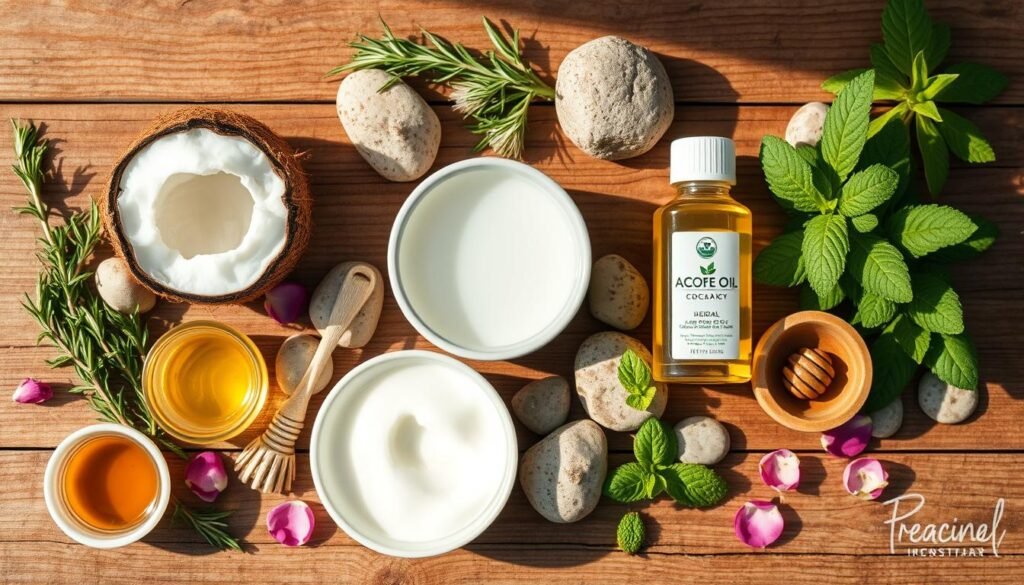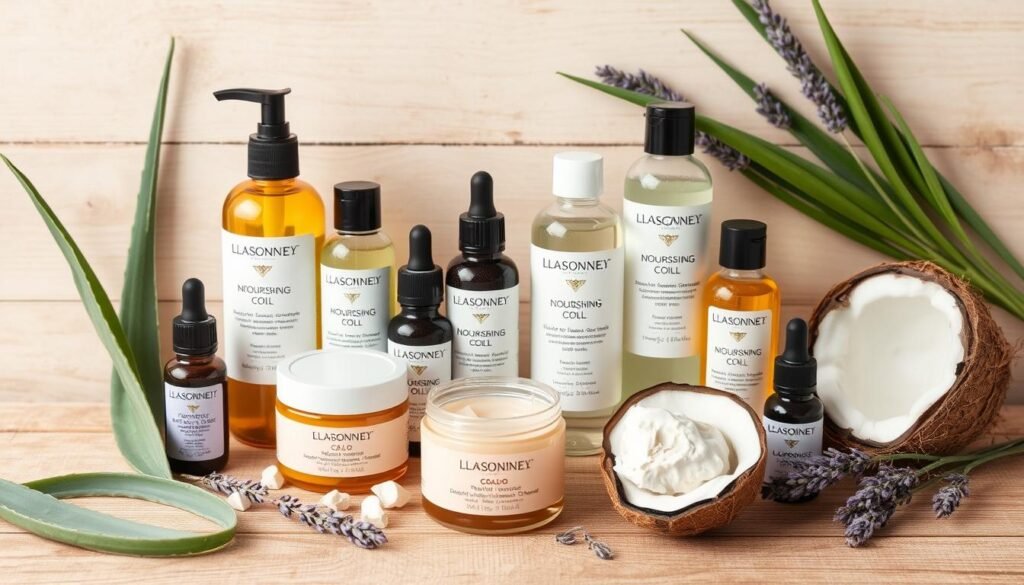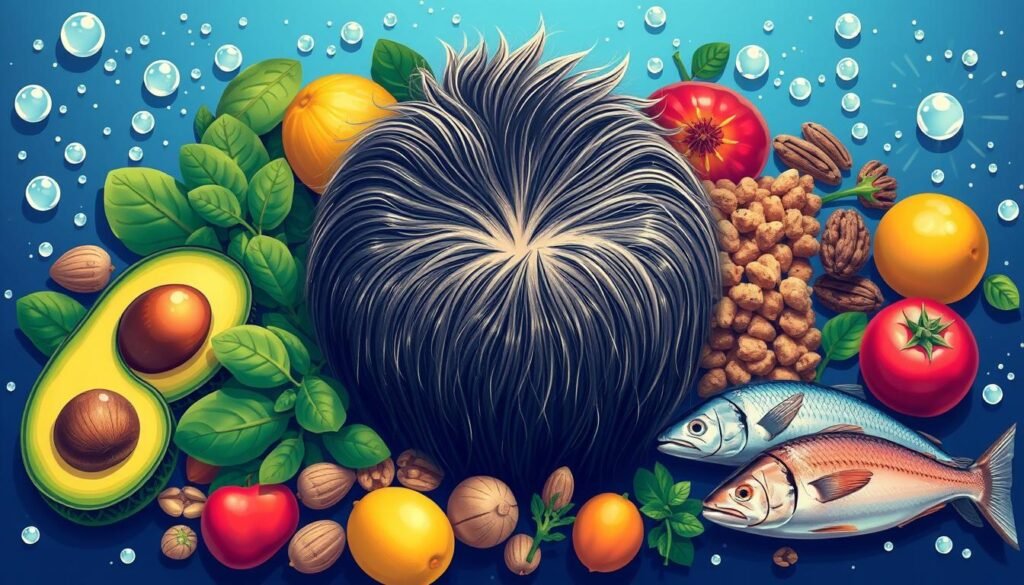Did you know more than half of adults deal with dandruff at some point? This issue can cause itchiness, irritation, and flakes. Yet, moisturizing every day is key in caring for your scalp. It helps a lot in fighting off dandruff. A solid scalp care routine that includes keeping hydrated can lessen dryness. It also cuts down on the oily residue that often leads to dandruff.
Talking about why daily moisturizing is vital for a healthy scalp is what we’ll do here. By using the right methods and picking good products, people can beat dandruff. This promotes a healthier scalp. Let’s explore how staying hydrated can make a big difference in scalp well-being.
Key Takeaways
- Over 50% of adults face dandruff issues at some stage in life.
- Daily moisturizing is crucial for maintaining a healthy scalp.
- Effective scalp care can lead to significant improvements in dandruff relief.
- Hydration helps mitigate dryness and irritation caused by dandruff.
- Small changes in your daily scalp care routine can yield big results.
Understanding Dandruff and Its Causes
Dandruff is a common condition that causes flakes and itching on the scalp. By understanding the causes of dandruff, people can better manage it. Factors like dry skin, certain hair products, and fungi on oily skin are common causes.
Dandruff comes in two main types: dry scalp and oily scalp. Dry scalp dandruff is often due to the environment, like cold weather. Meanwhile, oily scalp dandruff is linked to conditions like seborrheic dermatitis. Both can make a person feel uncomfortable and lower their self-esteem.
To treat dry scalp dandruff, it’s crucial to find out why it’s happening. Sensitive skin reacting to hair products is a common cause. Also, skin conditions like psoriasis and eczema can make things worse. If dandruff doesn’t go away, getting advice from a doctor is a good idea.
Knowing more about dandruff helps people deal with it better. For those looking to dive deeper, they can check out more information and tips at this comprehensive guide.
Importance of Moisturizing for Scalp Health
Moisturizing every day is key for a healthy scalp. It fights dryness and reduces flakiness. This greatly improves your scalp’s condition. By moisturizing, people can see their scalp health improve. It also makes their hair look and feel better.
Keeping your scalp moist helps your hair grow healthy. A well-hydrated scalp avoids problems like irritation and itchiness. It also strengthens the skin on your head. This protects against harm from the environment.
To illustrate the impact of moisturizing, consider the following table comparing the effects of a well-moisturized scalp versus a dry, neglected one:
| Aspect | Well-Moisturized Scalp | Dry Scalp |
|---|---|---|
| Hydration Level | Optimal | Low |
| Flakiness | Minimal | High |
| Hair Growth | Promoted | Impeded |
| Scalp Health | Healthy | Unhealthy |
| Itchiness | Rare | Frequent |
Making time for scalp care pays off in the long run. Knowing how moisturizing helps is the first step. A regular routine can make your scalp a great place for hair to thrive. This puts you on track to reach your hair goals.
Daily Moisturizing for Scalp Health
Daily moisturizing keeps the scalp healthy and balanced. It fights dandruff, soothes, and adds moisture. It’s important to pick the right moisturizer for your scalp’s health and comfort.
The Role of Moisturizers in Combating Dandruff
Anti-dandruff moisturizers are key to tackling dandruff. They ease irritation and reduce flakiness. A good moisturizer also shields the scalp. This keeps it moisturized properly, supporting healthy hair growth.
Selecting the Right Moisturizers for Your Scalp
Everyone’s skin is different, so choosing a moisturizer should be personal. You should look for ingredients like:
- Argan oil for deep hydration
- Hyaluronic acid for holding moisture
- Tea tree oil to fight fungi
- Aloe vera to calm the skin
Opt for products clearly marked as scalp moisturizers. Reading reviews and trying samples helps find what works best. A proper daily moisturizing routine is key to healthier scalp and less dandruff.
| Ingredient | Benefit |
|---|---|
| Argan Oil | Deep hydration and nourishment |
| Hyaluronic Acid | Moisture retention |
| Tea Tree Oil | Anti-fungal and soothing |
| Aloe Vera | Soothing inflammation |
Natural Ingredients for Scalp Hydration
Exploring natural ingredients can make your scalp healthier. Aloe vera and tea tree oil are top choices. They are known for their scalp care benefits.
Benefits of Aloe Vera for Scalp Care
Aloe vera is known for its soothing effect. It’s a great moisturizer and reduces scalp redness and itching. Aloe vera in scalp products can calm dandruff issues.
It locks in moisture, keeping the scalp healthy. This reduces flakiness and boosts scalp health.
Tea Tree Oil: Anti-Dandruff Powerhouse
Tea tree oil is great for tackling dandruff. Its anti-fungal qualities fight the main causes of flakiness. Adding it to your scalp routine can provide relief.
It’s in many hydrating scalp products. Tea tree oil offers a natural way to care for your scalp.

Daily Scalp Care Routine
An effective scalp care routine greatly improves scalp health and lessens irritation. It’s crucial to moisturize regularly to keep the scalp hydrated and fight off dryness. Here’s a straightforward guide to help you moisturize your scalp effectively, leading to better health.
Step-by-Step Guide to Effective Moisturizing
For the best results in your scalp care routine, follow these steps to moisturize effectively:
- Start with a Clean Scalp: Clean your scalp with a gentle cleanser to get rid of dirt and oil.
- Pat Dry: Gently pat your scalp dry with a towel after washing. Avoid rubbing to prevent irritation.
- Choose the Right Moisturizer: Pick a moisturizer made for the scalp. Look for hydrating ingredients in it.
- Application: Apply the moisturizer evenly with your fingertips. Pay extra attention to dry areas for thorough coverage.
- Massage: Massage the moisturizer in circles gently. This boosts absorption and stimulates blood flow.
- Leave-In or Rinse: Follow the product’s instructions on whether to leave it in or rinse it out.
How Often Should You Moisturize?
The right moisturizing frequency depends on your scalp’s condition. Daily moisturizing might be needed for severe dryness. For mild dryness or oily scalps, moisturizing less often works. The key is to tailor the moisturizing to meet your scalp’s needs.
Keeping a regular moisturizing schedule ensures lasting hydration for your scalp. Also, monitor your scalp’s reaction to adjust the treatment accordingly. This makes managing dry scalp more effective.
| Condition | Recommended Moisturizing Frequency |
|---|---|
| Severe Dryness | Daily |
| Moderate Dryness | Every other day |
| Mild Dryness | Twice a week |
Nourishing Scalp Products to Consider
Finding the right products for your scalp can greatly help with scalp health and dandruff relief. Here are a few recommended items that are great for hydrating the scalp:
- Head & Shoulders Scalp Care: This shampoo uses moisturizing agents and anti-dandruff elements. It helps reduce dryness and flakiness.
- Dove DermaCare Scalp: It includes scalp moisturizers that hydrate and gently exfoliate. It’s good for those with sensitive skin.
- Kiehl’s Scalp Purifying Serum: This serum is known for its nourishment. It eases irritation and helps maintain a healthy scalp.
- Neutrogena T/Gel Therapeutic Shampoo: It’s a proven treatment for dandruff. It hydrates and promotes a healthier scalp.
There are also many other treatment options and products to explore based on your scalp’s needs. Finding the best nourishing scalp products can significantly improve your scalp’s health and look.

Hydrating Techniques for Itchy Scalp Relief
Dealing with an itchy scalp can be tough. Thankfully, there are great hydrating techniques to help. These focus on boosting moisture and soothing irritation. One top method is scalp massages with oils like jojoba or coconut. It helps in moisturizing and increases blood flow for better hair growth.
Using a humidifier at home also does wonders. It keeps the air moist, which is key to stopping scalp dryness. This is especially handy in the cold months when indoor heating dries the air out.
Choosing a scalp-friendly cleanser is vital, too. Gentle cleansing keeps natural oils intact and prevents product buildup. A routine of cleansing and hydrating treatments will boost scalp health for lasting comfort.
You might also try sulfate-free shampoos and deep conditioning masks. For more on restoring moisture, check out effective techniques for scalp hydration. These tips are great for keeping your scalp calm and moisturized.
How Diet Impacts Scalp Health
The link between what we eat and the health of our scalp is often overlooked. Eating right can greatly improve your scalp’s condition. This can help stop and manage dandruff. Knowing which nutrients are good for your scalp lets you choose the best foods.
Nutrients Essential for Healthy Scalp
Certain nutrients are vital for keeping the scalp hydrated and healthy. These key nutrients include:
- Omega-3 fatty acids: They help keep the scalp moist and lower swelling.
- Vitamin E: It boosts blood flow to the scalp and fights off damage as an antioxidant.
- Biotin: This is key for strong hair, making the scalp tougher.
- Zinc: It strengthens the immune system and controls how much oil the scalp makes.
- Vitamin A: It’s important for keeping the skin healthy and speeding up cell renewal.
Foods to Incorporate into Your Daily Meal Plan
Eating foods full of certain nutrients can help your scalp stay healthy. Here are some foods to add to your meals:
| Food | Nutrient Benefits |
|---|---|
| Salmon | Packed with omega-3 fatty acids and vitamin D. |
| Spinach | Has iron, vitamins A and C, all good for the scalp. |
| Nuts (Walnuts, Almonds) | They’re full of omega-3 fatty acids and vitamin E. |
| Sweet Potatoes | Has beta-carotene, which turns into vitamin A in our body. |
| Eggs | A great source of biotin and protein. |
Add different foods from this list to your daily diet for a healthier scalp. Taking care of your scalp starts with your diet. Healthy eating leads to a healthy scalp and overall wellness.

Common Myths About Dandruff and Moisturizing
Many people believe in myths about dandruff affecting their care routines. One myth is that moisturizing makes dandruff worse. Actually, keeping the scalp hydrated is key for good health, whether you have dandruff or not. Moisturizers help balance the scalp’s oils, improving its health.
Another wrong belief is that dandruff only happens to those with oily skin. This ignores that dryness can also cause dandruff. Whether your scalp is dry or oily, you can still get dandruff.
Some also wrongly think washing hair often can increase dandruff. But, washing regularly helps remove flakes and keeps the scalp clean. Choosing the right shampoo and conditioner for your type of scalp can improve things.
It’s important to look at what’s in your hair care products. Ingredients like tea tree oil and aloe vera can really help. Knowing the truth behind these myths about dandruff helps you make smarter choices for your scalp care.
| Myth | Truth |
|---|---|
| Moisturizing worsens dandruff | Hydration helps maintain scalp health. |
| Dandruff only affects oily scalps | Both oily and dry scalps can develop dandruff. |
| Frequent shampooing increases dandruff | Regular washing can help control flakes. |
| All products are suitable for dandruff | Choose products specific to individual scalp needs. |
Conclusion
Maintaining a daily moisturizing routine is key to healthy scalp and dandruff control. This article has shown the importance of moisturizing every day. It helps nourish the scalp and stops it from getting dry, which can lead to more flakes.
Different hair types and ethnic backgrounds require unique care, as the Malaysian medical student study showed. By choosing the right products and methods, you can keep your scalp in top shape. Tailoring your hair care is critical in avoiding excessive dandruff.
Being open to trying new scalp care methods is beneficial. Everything from natural ingredients to smart eating choices can help your scalp. For further information, reviewing studies like this one can offer deep insights. Knowledge and consistent care are essential for a healthy, flake-free scalp.